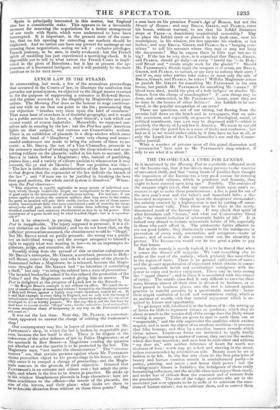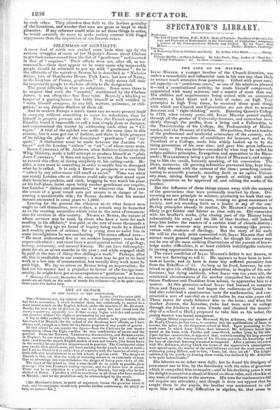THE INCOME-TAX A CURE FOR LUXURY.
IT is mentioned by the Morning Post as a probable collateral merit of the Income-tax, that it has driven many persons to the exercise
of unwonted thrift, and that "many heads of families have thought the imposition of the Income•tax a very good excuse for entering upon household reforms, which, in prudence and honesty, they ought to have entered upon long ago." Possibly. The enemies of the measure might retort, that any unusual drain upon men's re- sources is apt to make them parsimonious : a fire is paid for out of the next year's rent and the tailor's and household bills ; a dis- honoured acceptance is charged upon the daughters' dressmaker ; the subsidy exacted by a highwayman is met by cutting off osten- tatious servants' vails. Thus there may he truth in the newly- discovered merit of the Income-tax. It may check that spirit of what historians call "luxury," and what our Conservative friend calls "the absurd imitation of aristocratic habits of life." It is indeed very absurd to imitate aristocratic habits of life, especially in those who can't afford it. The aristocratic habits alluded to are not good habits : they distinctively consist in the indulgence or prevention of every want, ostentation, and arrogance—waste of means ; and of course, if the means exist not, the absurdity is greater. The Income-tax would not be too great a price to pay for that lesson.
But as the remedy is merely topical, it is to be feared that when it ceases the disease will reappear. We want something else to strike at the root of the malady ; which probably lies somewhere in the region of taste. There is no general cultivation of taste ; and the grosser apprehension of enjoy ment which obtains in conse- quence, confounds lavish and ostentatious indulgence with the power to enjoy and bestow enjoyment. There may be taste among the " upper classes" ; and in them it is associated with this excess of outlay. The middle class find it very difficult to exercise their taste, because almost all their time is devoted to business, or at least passed in business places, and the rest is tabooed against practice in tasteful pursuits by a questionable morality : hence their stupid confusion of lavish and ostentatious outlay, which is an accident of wealth, with that tasteful enjoyment which is ac- quired by leisure and opportunity. To go deeper still, falsehood is at the bottom of it—the setting up of forms for idols to represent virtues or qualities; which they do about as much as the wooden doll of the savage does the Deity whose worship it usurps. Titles are given to men to mark them out as "respectable," and the title supersedes the qualities which excites respect, and is more the object of an emulous ambition : it procures that false homage, and thus by a reaction insures rewards which virtue misses. Courteous forms are instituted to typify kindly feelings ; but becoming a matter of course, they survive the motive, which dies from inanition; and men bow to each other and address "my dear sir," with neither deference of heart for worth nor dearness of love: worth may go naked and starving in the street, unless recommended by adventitious aids. Beauty must be set in fashion to be felt. In the fine arts alone do the first principles of beauty and human emotion remain in unadulterated purity—in poetry, painting, and music ; and hence their power : but the working-man's leisure is forbidden the indulgence of those really humanizing influences, and the middle-class man enjoys them rarely, and under fear of ridicule from the coxcomb and of censure from the precisionist. The aim of the vulgar moralists who are in the ascendant just now appears to be to stifle or to minimize the emo- tions of human nature; not to cultivate them, and to correct them by each other. They abandon that field to the lawless geniality of the licentious, and wonder that men are gross or inept in their pleasures. If any reformer could arise to set these things in order, he would certainly do more to make society content with frugal enjoyments than the imposition of ten Income-taxes.



























 Previous page
Previous page